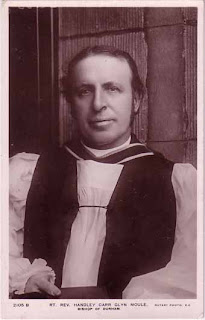ii. Now turn to the promise of the Well. Its main concern is with the personal possession of this Gift; not yet with its liberation, so to speak, and distribution through the possessor. The Lord undertakes that the man who drinks that water shall never thirst; obviously in the sense of never needing to complain of an intermittent supply from this well. He shall find that he has received the ultimate answer to his entire end. He shall find that he has so received it that he may, if he will, be always enjoying it, always resting in it, always living in it.
To follow the precise words further, the water which Christ shall give him, the water which he shall owe to the work and love of Christ, “shall become (so literally) in him a spring of water, of water leaping up, unto eternal life.”
I do not examine minutely those last three words. It is interesting to ask whether they mean, “until the arrival of the state of glory, the ultimate phase of eternal life,” or whether they may not rather mean, “unto, resulting evermore in, the present realities and experiences of eternal life”; in other words, “so as to underlie, secure, and blessedly convey, the life of “God in Christ evermore to the needs and longings of the man.” But it is not material now to discuss this.
What is material is the assurance that “the water shall become in him a spring of up-leaping water.” Here we have, for one thing, the delightful assurance (let us treat it as an assurance) that the holy Thing shall be in the man. The context shows that the special point of the thought here is that he shall carry it about with him, in the depth of his being, always and everywhere. He shall not need to travel, or to toil, to get it within him. In his travelling and in his toiling it shall be within him. Go where he may, do, bear, what he may, meet whatever he may at any time by way of circumstances, he shall not be dependent for a moment upon circumstances for his water of life. It is his by gift. It is in him always, in him now. Alone with self and the Tempter, he bears it in him. Deep in the stress and throng of life, it is in him. In his strongest hour, and in his weakest, this holy Thing, which is not himself but the Spirit, and Christ by the Spirit, is in him.
Then further observe the phrase, “it shall become a spring of up-leaping water.” Is it not as much as to say that the Gift as realized, and watched, and used, shall develop its true character and preciousness? It might be suspected at first to be but a cup; it shall soon prove to be a source, a spring, a depth originating in God. It shall be not only always there, but always new there, while always the same there. The happy possessor of it shall be always antecedently supplied for all circumstances, in this experience and discovery that the water is a spring. And thus he shall be independent of circumstances, in a sense very real and happy. He will be no despiser of “means of grace;” nay, he will prize them in their right use more than ever. But they will be to him means of cultivation and advance in the knowledge and the use of grace far rather than supposed originations of it. His water-spring is within him, always within him.
And it proves to be a spring of water “leaping up.” The imagery is beautifully special. The immortal supply is from an ultimate Source so living that its flow has not motion only but a motion of gentle while vivid life. The idea conveyed is that of “the Spirit’s calm excess,” in the beautiful words of an ancient hymn. The soul’s experience shall have about it a chastened life and brightness through Him who thus divinely dwells within. Joy, in the pure depth of that word in the spiritual vocabulary, joy shall pervade the being. The certainties of grace, of the Spirit, of Christ, shall give to the soul a commentary all their own on the apostolic word, “always rejoicing.” Yes, there shall be that humble but profound pleasure, which we have studied above,* pleasure even in distresses, in infirmities, “that the power of Christ may overshadow us.”
Such is the matter as it stands in the personal and definite promise of the Lord at the Well. Let me take it, let me remind my reader to take it, in its holy simplicity and fulness. And “having this promise, let us cleanse ourselves.” Let us do our practical part by seeing to it, in watching and prayer, that the weeds and rubbish are cleared from the basin of the spring, and that no stone lies needlessly upon its mouth.
*
Image source: http://www.postcardworld.co.uk/cards/subject/socialhist/religion.htm


Comments